Abstract
Background:
COVID-19 pandemic is an unprecedented public health emergency. When the pandemic started in our country fertility treatment was suspended for sometimes following national and international guidelines. This has led to delay in fertility treatment for some couples which was emotionally upsetting.
Methodology and Design:
This study was done on the patients enrolled at our various fertility units across India. The survey questionnaire was sent to patients during the month of first May to June 15, 2020, when COVID-19 pandemic was active across the country, and fertility units were just resuming the services back. The questionnaire was distributed to 100 patients who were currently under treatment and their response was recorded. Ethical committee approval was not taken as surveys are exempted from IRB.
Results:
This survey was undertaken to understand the emotional impact of delay/cancelation in the fertility treatment during the COVID-19 pandemic. The survey revealed that majority (95%) of couples felt cancelation of cycles as upsetting and 16% reporting it to be extremely upsetting. The impact was seen in the form of mood disturbances, anxiety, sleep disturbances, and depressive ideas. Almost half of the couples (49.4%) were desirous to start the fertility treatment immediately. Their knowledge regarding COVID-19 and pregnancy and future child was limited.
Conclusion:
COVID-19 has had impact on every sphere of life. Delay in treatment and cancelation of cycles were emotionally upsetting to majority of couples and they were keen to restart the treatment sooner than later.
KEYWORDS: COVID-19, delay in fertility treatment, emotional impact
INTRODUCTION
As the whole world is grappled by the corona pandemic, the focus has been on dealing with this health-care emergency. Health-care sector all over the globe is focused on measures to prevention, timely diagnosis, and appropriate management of COVID-19. As a result, many of the essential but nonemergency medical services have suffered across countries during this pandemic.[1,2] Fertility treatment is one such problem. Approximately, one out of seven couples across the globe is suffering from fertility issues. Many of them seek various forms of fertility treatment which may be in the form of ovarian stimulation, intrauterine insemination (IUI), in vitro fertilization (IVF), fertility preservation for cancer, or social reasons. During the COVID-19 pandemic, all countries took some preventive measures to halt spread of infection. Many countries imposed lockdown as a measure to encourage social distancing. This has brought all fertility treatment to standstill. Fertility societies including the American Society for Reproductive Medicine (ASRM), ESHRE, and national fertility societies across different countries issued guidelines which led to halt in fertility treatments across the globe during the month from March to April 2020.[3,4] This has affected tremendously the couples undergoing fertility treatment emotionally and psychologically.[1] Few of them with advancing age felt their biological clock is ticking and they are losing their hope to become parents. Few had cycle cancellation and felt frustrating and emotionally upset.[5]
We have taken this survey questionnaire from patients who were enrolled for fertility treatment with us. The impact of the COVID-19 pandemic on the patient's behavior and fertility treatment was analyzed.
METHODOLOGY
This study was done on the patients enrolled at our various fertility units across milann fertility center. The survey questionnaire was sent to patients from May 1, to June 15 when COVID-19 pandemic was active across the country, and fertility units were just resuming the services back. We have five fertility units across the country and the survey questionnaire was shared with 100 patients enrolled for treatment across all five centers. The questionnaire was distributed to patients who were currently under treatment. Data collected included demographic characteristics such as age, duration of infertility, previous pregnancy details, prior fertility treatment if any, educational status, and distance from fertility unit. The survey questionnaire addressed questions to understand any change in their behavior such as sleep pattern, anxiety, anger, and fear during the pandemic. The effect of delay in fertility treatment was analyzed and they were asked about their views regarding effect of COVID-19 on pregnancy and whether delay in treatment was justified.
Intervention- None.
Ordinal data such as responses were rated on a Likert scale. The results of the study are presented as percentage. Pie chart and Bar diagram have been used to represent the data.
Written informed consent was obtained from all the participants. Ethical committee approval was not taken as surveys are exempted from IRB permission.
RESULTS
A total of 86 patients responded to the survey questionnaire, response rate being 86%. Different number of participants responded to different questions. Respondents included 94% of females and 6% males. Majority (70%) of respondents were in the age group of 25–35 years. Three fourth of them (73%) had no previous pregnancy. Their duration of infertility varied from 1 year to 18 years. Thirty-six among them had some medical problems in the form of thyroid disorders (19.4%), diabetes (5.6%), high blood pressure on treatment (2.8%), and 72% reported other nonspecified illnesses. None of them had cardiac disease.
Eighty-three respondents answered regarding any previous pregnancy, out of which seven (8.4%) had a living baby and 15 (18.1%) have had a miscarriage. Among 83 who responded to question on previous fertility treatment, 16 (19.3%) had already undergone IUI and 17 (20.5%) had tried IVF before the current treatment cycle.
A total of 41 couples (50%) got their treatment canceled during the COVID-19 pandemic. It was either a FET cycle, fresh IVF cycle or IUI cycle, or other forms of fertility treatment which got canceled [Figure 1].
Figure 1.
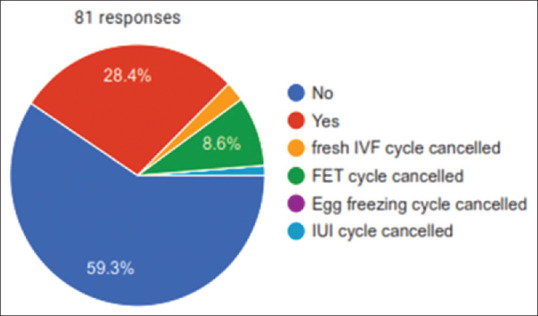
Was your fertility treatment canceled due to the COVID-19 lockdown?
When asked about the type of treatment planned before lockdown, majority were IVF cycle cancellations. Rest were either follicular scans, IUI, initial workup or hysteroscopy and laparoscopy [Figure 2].
Figure 2.
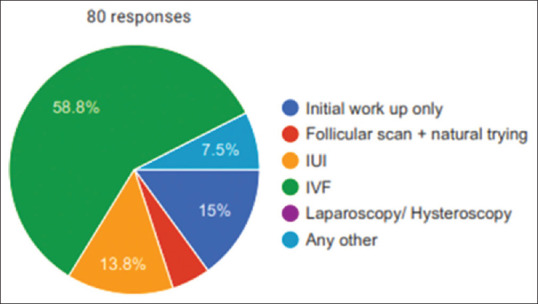
Treatment planned
To know the impact of the cancelation of fertility treatment, we recorded the results on a scale of one to five depending upon severity of how upsetting it was? Majority said treatment cancelation was upsetting. Ten of 61 respondents (16.4%) quoted it be extremely upsetting. Only 4 (6.6%) couples said treatment cancellation was not upsetting [Figure 3].
Figure 3.
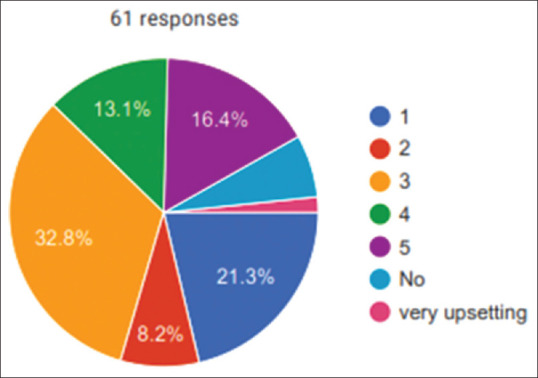
How upsetting was canceled of treatment (on a scale of 1–5, 1 = no effect, and 5 = extremely upsetting)
Emotional impact was seen in the form of severe sleep disturbances (rated as 4 or 5 on a scale of 1–5) in 7 (10.9%), feeling anxious in 9 (14.1%), mood disturbances in 12 (18.4%), and depressive thoughts in 11 (17.2%) [Figures 4 and 5].
Figure 4.
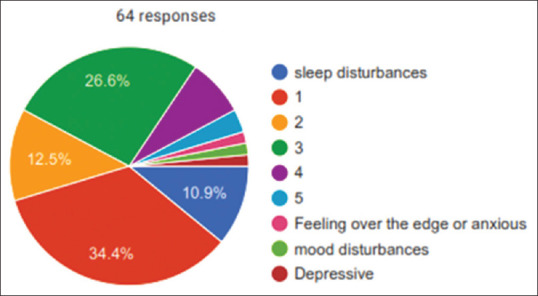
Any psychological impact od delay treatment (on a scale of 5, 1-no effect, 5 = severly affected)
Figure 5.
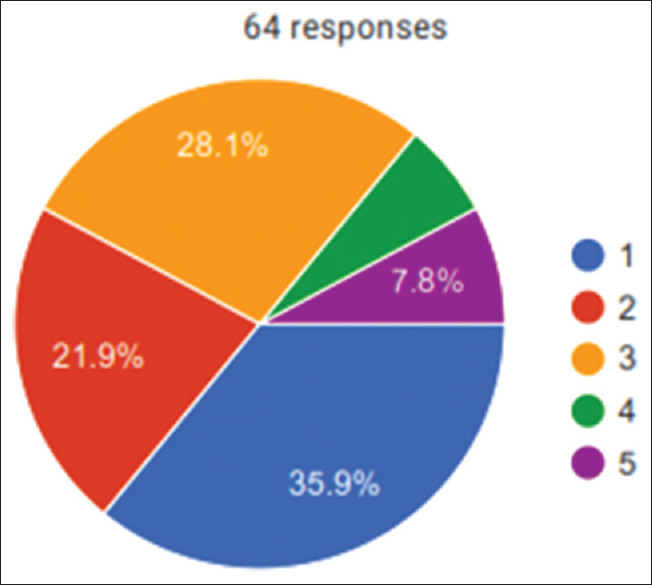
Feeling over the edge or anxious
Here are statements of few of the patients whose treatment got canceled:
“Make me stuck out of country for further treatment.”
“The pandemic has affected me and all our family members financially, emotionally and mentally quiet a lot.”
“I'm based at XXXXX and was due to fly to XXXXX in April to do a FET cycle. My plans are now cancelled due to restrictions on international air travel and I don't know when flights will resume.”
“My treatment got delayed and postponed because of the pandemic. This depressed me a lot.”
Almost half of them (52%) disagreed that fertility treatments should have been suspended during the current time when pandemic is active across the country. Moreover, majority (49%) felt they are desirous to restart the fertility treatment during this period of pandemic [Figure 6].
Figure 6.
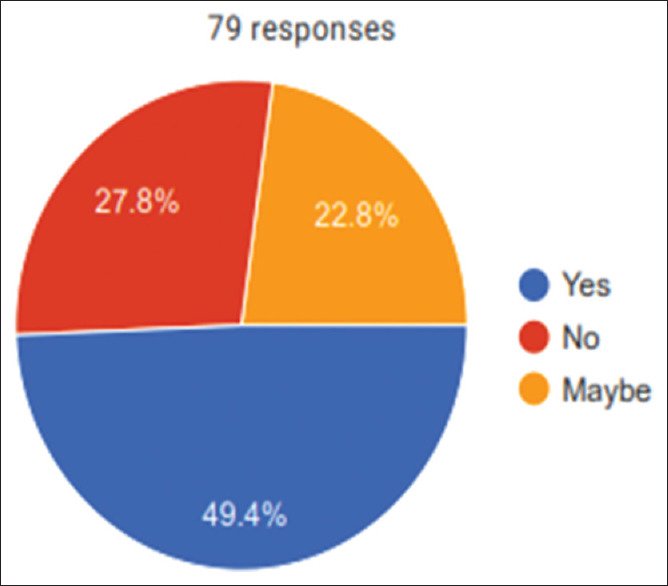
Are you desirous to start new treatment cycle during this COVID pandemic?
When asked about the effect of COVID-19 on fertility and pregnancy, of the 77 respondents, 37 (48.1%) felt they do not know about the effect on the future child, 7 (9.1) said it will definitely affect the future child and 10 (13%) felt it might affect the future child [Figure 7].
Figure 7.
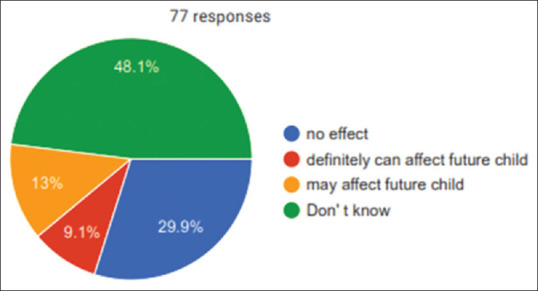
What understanding do you have effect of corona on fertility treatments?
Of the 76 respondents, 10 (13.2%) felt pregnant women are at higher risk compared to the general population, 27 (35.5%) felt pregnancy may impose a higher risk, whereas 9 (11.8%) felt risk to pregnant women is similar to general population. Thirty (39.5%) were not aware about effect of COVID-19 on pregnancy [Figure 8].
Figure 8.
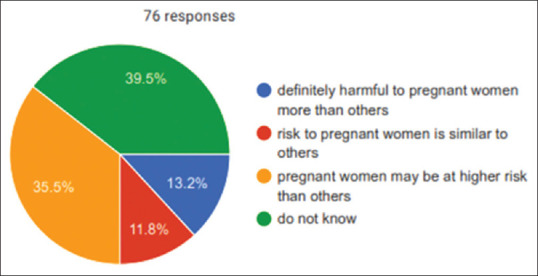
Your understanding of effect of corona on pregnancy
Six out of 75 respondents (8%) conceived naturally during the lockdown while waiting for fertility treatment [Figure 9]. Some of respondents did mention about some positive behavioral changes such as becoming more health cautious, improvement in self-confidence, regaining patience, and feeling more relaxed and healthier. Following are the statements recorded from few of the patients:
Figure 9.
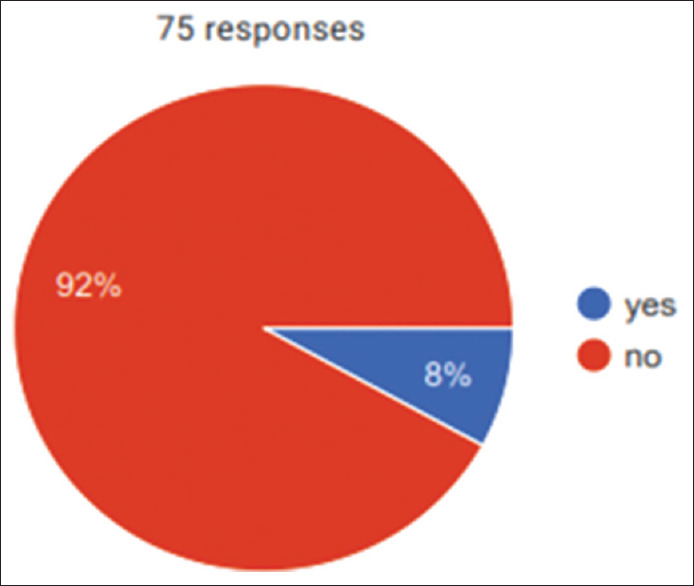
Have you conceived naturally during the lockdown
“Became more patient and appreciated the innate qualities of life that makes it beautiful.”
“More relaxed and feeling healthier.”
“Nothing major as such, i have learned become more patient and concentrate more on my health.”
DISCUSSION
COVID-19 has affected every sphere of life globally. It has led to tremendous social, economic, political, and health-care changes all across the globe. Many people are faced with emotional challenges to deal with this changing scenario. As lockdown was imposed across the country by end of March, all the fertility treatment came to a standstill to abide by the national and international guidelines. ASRM, ESHRE, and IFFS released their bulletin recommending to halt the fertility treatment in the beginning of April.[3,4] During this time the focus of health-care facilities was to deal with this emergency and all healthcare resources were diverted to curtail the spread of COVID-19. In our country, a joint statement was released by national fertility societies reinforcing the international guidelines and suggested to keep fertility treatment suspended. This led to mixed emotional response amongst the couples planning to undergo fertility treatment.
We had a total of 41 couples whose treatment cycles were canceled during the month of March-April. It was either an IVF cycle/IUI cycle of the FET cycle. A few of them were planned for hysteroscopy or laparoscopy as pre-treatment workup and got their surgery delayed. While the fertility services were resumed back in the month of May as per the National and International Fertility Society recommendations, we also started functioning while taking all precautions at workplace.[6,7,8,9]
Majority of couples felt cancellation of fertility treatment to be upsetting. On a scale of 1–5, 10 (16.4%) felt it to be extremely upsetting. Emotional impact was seen in the form of severe sleep disturbances in seven (10.9%), feeling anxious in nine (14.1%), mood disturbances in 12 (18.4%), and depressive thoughts in 11 (17.2%). This indicates the need for strengthening psychological counseling services in fertility units. In a survey published in fertility sterility,[5] among the patients whose treatment was canceled due to the COVID-19 pandemic, almost 85% found it be moderately to extremely upsetting and 22% rated it equivalent to loss of a child. This emotional impact was seen irrespective of the type of treatment cycle canceled.
In our survey, almost half (52%) of the couples disagreed that fertility treatment should be suspended during the COVID-19 pandemic our findings are almost in line with the ASRM survey wherein, only 5% of patients felt that diagnostic procedures such as hysterosalpingogram should be canceled and only 36% were in agreement for cancelation of all fertility treatment.
Of all the respondents, the majority (49%) felt they are ready to start the fertility treatment during this time period of pandemic. In ASRM survey, almost 82% of respondents said they would prefer to start treatment under the guidance of their doctor.[5]
Of the respondents who answered about the effect of COVID-19 on pregnancy and fertility, majority were not aware about the effects. This indicates the need of more health-care awareness programs, especially for this special group. Although currently, the knowledge about the long term fetal effects of COVID-19 is limited, we need to share this knowledge with our patients so that they can make an informed choice to decide about the fertility treatment in the current scenario. Although the latest update from ESHRE stated that any risk of viral contamination to gamete and embryos in the IVF laboratory is likely to be minimal because of the repeated washing steps required for the culture and freezing protocols.[10] However, as this is an evolving situation and there is a lack of high-quality evidence at the moment, it is difficult to make the final comment on this and we need to make our patients aware about this limited knowledge in the current scenario.
Almost 40% of our patients were not aware of the effects of COVID-19 on pregnancy. So far COVID-19 infection in pregnancy has been shown behave similar to the general population as far as severity and mortality are concerned.[11] Our would be mothers need to be aware about the special needs of pregnancy, immune alterations in the antenatal period and the evidence available so far, so that they have the best available knowledge regarding COVID-19 and pregnancy.
Surprisingly, six of 75 respondents (8%) conceived naturally while waiting for the fertility treatment during the lockdown period. Similar observations have been reported by few other IVF practitioners as well who had reported a noticeable rise in natural conception rates during the lockdown period. One IVF clinician, on May 18, reported nine cases of natural conception among couples who could not complete the IVF cycle due to lockdown during March-April.[12] This may be because of families being close together, less work-related stress, more focus on individual health, and improvement in diet and environmental pollution during the lockdown period.
CONCLUSION
Couples have mixed feelings about the fertility treatment during the COVID-19 pandemic and majority were upset by the cancelation of treatment cycles. Most of the couples were desirous to restart the fertility treatment under current condition under all safety precautions. Patients knowledge regarding the effects of COVID-19 of fetus and pregnancy was limited indicating the need of more patient awareness campaigns. This survey highlights the need for further strengthening of the psychological counseling services in fertility units owing to the emotional impact of COVID-19.
Limitations
The number of participants is less as we distributed the questionnaire to couples currently under treatment. Not all the participants responded to all the questions, so the responses of non-respondents may be different from those who have responded to a particular question. Those with a strong opinion are more likely to respond to particular question. We have specified the number of respondents against each question in the results section.
As the COVID-19 is a rapidly evolving situation across the world, patients' opinion may differ as the situation unfolds further. A longitudinal follow-up would be helpful to track the changes in patients emotional behavior.
From the survey, it is difficult to assess how much of the stress was on account of pandemic itself and how much was due to infertility or cancellation of treatment.
Financial support and sponsorship
Nil.
Conflicts of interest
There are no conflicts of interest.
Acknowledgment
All consultants and staff of Milann fertility who supported for data collection.
REFERENCES
- 1.Gordon JL, Balsom AA. The psychological impact of fertility treatment suspensions during the COVID-19 pandemic. PLoS One. 2020;15:e0239253. doi: 10.1371/journal.pone.0239253. [DOI] [PMC free article] [PubMed] [Google Scholar]
- 2.Cohut M. How the Pandemic has Affected the Primary Healthcare Around the World. Brighton, UK: Medical News Today Newsletter; 2020. [Google Scholar]
- 3.American Society for Reproductive Medicine (ASRM) Patient Management and Clinical Recommendations during the Coronavirus (COVID-19) Pandemic. [Last accessed on 2020 Apr 13]. Available from: https://www.asrm.org/globalassets/asrm/asrm-ontent/newsandpublications/covid-19/covidtaskforceupdate1.pdf .
- 4.ESHRE Guidance on Recommencing ART Treatments. Document Prepared by the ESHRE COVID-19 Working Group. [Last accesed on 2020 Apr 23]. Available from: https://www.eshre.eu/Home/COVID19WG .
- 5.Turocy J, Robles A, Hercz D, D'Alton M, Forman EJ, Williams J. To survey fertility treatment patients' agreement with ASRM recommendations during COVID-19 pandemic and the emotional impact on them. Fertil Steril. 2020;114:e63. [Google Scholar]
- 6.Prasad S, Trivedi P, Malhotra N, Patil M, Swaminathan D, Shukla S, et al. Joint IFS-ISAR-ACE recommendations on resuming/opening up ART services. J Hum Rep Sci. 2020;13:82–8. doi: 10.4103/jhrs.JHRS_109_20. [DOI] [PMC free article] [PubMed] [Google Scholar]
- 7.The Association of Reproductive and Clinical Scientists (ARCS) and British Fertility Society (BFS) U.K. Best PracticeGuidelines for Reintroduction of Routine Fertility Treatments during the COVID-19 Pandemic. [Last accessed on 2020 May 06]. Available from: https://www.britishfertilitysociety.org.uk/wp.content/uploads/2020/05/ARCS-BFS-COVID-19-guideline-v1.1-1.pdf .
- 8.ESHRE Guidance on Recommencing ART Treatments. Document Prepared by the ESHRE COVID-19 Working Group. [Last acceed on 2020 May 29]. Available from: https://www.eshre.eu/Home/COVID19WG .
- 9.American Society for Reproductive Medicine (ASRM) Patient Management and Clinical Recommendations during the Coronavirus (COVID-19) Pandemic. [Last accessed on 2020 Jun 08]. Available from: https://www.asrm.org/globalassets/asrm/asrm-ontent/newsandpublications/covid-19/covidtaskforceupdate1.pdf .
- 10.Antonio R, Cruz M, Vergara V, Prados N, Galliano D, Antonio P. A picture of the Covid-19 impact on IVIRMA fertility treatment clinics in Spain and Italily. Reprod Biomed Online. 2020;41:1–5. doi: 10.1016/j.rbmo.2020.04.015. [DOI] [PMC free article] [PubMed] [Google Scholar]
- 11.Royal College of Obstetricians and Gynecologists. Coronavirus (COVID-19) Infection in Pregnancy. Information for Healthcare Professionals. 2020. [Last accessed on 2020 Sep 15]. Available from: https://www.rcog.org.uk/globalassets/documents/guidelinees/2020-04-17-coronavirus-covid-19-infection-in-pregnancy.pdf .
- 12.Umesh I. Pune: Noticeable Rise in Natural Pregnancies during Lockdown Baffles IVF Experts. [Last accessed on 2020 Sep 15]. Available from: https://www.timesofindia.indiatimes.com/city/pune/pune-noticeable-rise-in-natural-pregnancies-during-lockdown-baffles-ivf.experts/articleshow/75795453.cms .


